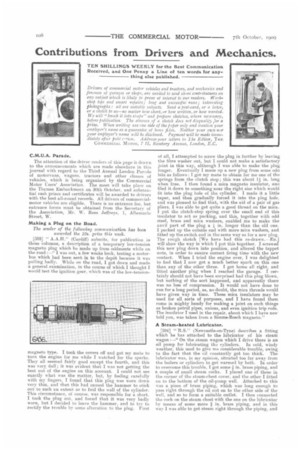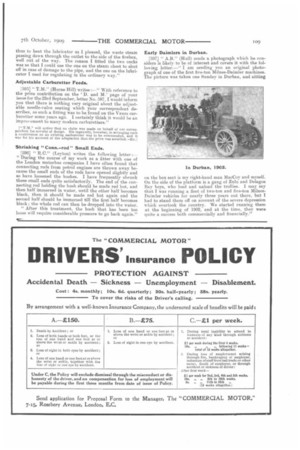Contributions from Drivers and Mechanics.
Page 20

Page 21

If you've noticed an error in this article please click here to report it so we can fix it.
TEN SHILLINGS WEEKLY for the Best Communication Received, and One Penny a Line of ten words for any..
thing else published.
Drivers of commercial motor vehicles and tractors, and mechanics and foremen 01 garages or shops, are invited to send short contributions on any subject W h ch is likely to prove of interest le our readers. Workshop tips and smart repairs ; long and successful runs ; interesting photographs : all are suitable subjects. Send a post-card, or a letter, or a sketch to us—no inatter how short, or how written, or how worded. We will "knock it into shape" and prepare sketches, where necessary, before publication. The absence of a sketch does not disqualify for a prize. When writing use one side of the paper only and mention your employer's name as a guarantee of bona fides. Neither your own nor your employer's inime will be disclosed. Payment will be made immediately after publ ration. Address. your letters to 1 he Editor, THE COMMERCIAL Moron, 7 75, Rosebery Avenue, London, E.C.
C.M.U.A. Parade.
The attention of the driver readers of this page is drawn to the announcements which are made elsewhere in this journal with regard to the Third Annual London Pare& of motorvans, wagons. tractors and other classes of vehicles, which is being organized by the Commercial Motor Users' Association. The meet will take place on the Thames Embankment on 30th October, and substantial cash prizes and certificates will be awarded to drivers with the best all-round records. All drivers of commercialmotor vehicles are eligible. There is no entrance fee, but entrance forms must be obtained from the Secretary of the Association, Mr. W. Rees Jeffreys, 1, _Albemarle Street, W.
Making a Ping on the Road.
The sender of the following communication has been awarded the 10s. prize this week.
[593] " A.A.H." (Cardiff) submits, for publication in these columns, a description of a temporary low-tension magneto plug which he made up from oddments while on the road :—" I was out, a few weeks back, testing a motorbus which had been sent in to the deptit because it was pulling badly. While on the road, I got down and made a general examination, in the course of which I thought I would test the ignition gear, which was of the low-tension magneto type. I took the covers off and got my mate to turn the engine for me while I watched for the sparks. They all seemed fairly good except the fourth, and this was very dull ; it was evident that I was not getting the best out of the engine on this account. I could not see exactly what was the matter, but, by feeling earef oily with my fingers, I found that this plug was worn down very thin, and that this had caused the hammer to stick out to such an extent as to foul the wall of the cylinder. This circumstance, of course, was responsible for a short. I took the plug out, and found that it was very badly worn, but I decided to leave the hammer, and to try to rectify the trouble by some alteration to the plug. First of all, I attempted to screw the plug in further by leaving the fibre washer out, but I could not make a satisfactory joint in this way, although I was able to make the plug longer. Eventually I made up a new plug from some odd bits as follows : I got my mate to obtain for me one of the springs from the clutch stop; this was about I in. long when free. I then found a mica magneto insulator, ann filed it down to something near the right size which would fit into the plug hole of the cylinder. I made it a little taper, and then gradually forced it into the plug hole, and was pleased to find that, with the aid of a pair of gas pliers, I was able to get quite a good thread on the mica. I put the clutch-stop spring over the small end of this insulator to act as packing, and this, together with odd steel, brass and mica washers, enabled me to make the anvil part of the plug a in. longer than the old one. I packed up the outside end with more mica washers, and fitted up the switch end in the same way as for a new plug. The rough sketch [We have had this re-drawn.—En.j will show the way in which I put this together. I screwed this new plug down into position, and altered the tappet nuts, in order to ensure correct firing time with the new contact. When I tried the engine over, I was delighted to find that I now got a much better spark on this one than any of the other three. I got home all right, and fitted another plug when I reached the garage. I certainly should not have been surprised had this plug blown. but nothing of the sort happened, and apparently there was no loss of compression. It would not have done to run for a long period, as, no doubt, the mica threads would have given way in time. These mica insulators may be used for all sorts of purposes, and I have found them come in mighty handy for making a joint on such things as broken petrol pipes, unions, and even ignition trip rods. The insulator I need in the repair, about which I have now told you, was taken from a Simms-Bosch magneto."
A Steam-heated Lubricator.
[594] " R.S." (Newcastle-on-Tyne) describes a fitting which he has attached to the lubricator of his steam
wagon On the steam wagon which I drive there is an oil pump for lubricating the cylinders. In cold, windy weather, this used to give me considerable trouble, owing to the fact that the oil constantly got too thick. The lubricator was, in my opinion, situated too far away from the boilers or cylinders to get warmed by both. In order to overcome this trouble, I got some j in. brass piping, and a couple of small steam cocks. I placed one of these in the corner of the steam-chest cover, and the other I fitted on to the bottom of the oil-pump well. Attached to this was a piece of brass piping, which was long enough to pass right through the oil out on to the other side of the well, and so to form a suitable outlet. I then connected the cock on the steam chest with the one on the lubricator by means of some more in. brass piping, and in this way I was able to get steam right through the piping, and thus to heat the lubricator as I pleased, the waste steam passing down through the outlet to the side of the firebox, well out of the way. The reason I fitted the two cocks was so that I could use the one on the steam chest to shut off in case of damage to the pipe, and the one on the lubricator I used for regulating in the ordinary way."
Adjustable Carburetter Feeds.
[5951 " T.M." (Herne Hill) writes :—" With reference to the poise contribution on the D. and M.' page of your issue for the 23rd September, letter No. 587, I would inform you that there is nothing very original about the adjustable needle-valve seating which your correspondent describes, as such a fitting was to be found on the Vaurs carburetter some years ago. I certainly think it would be an improvement to many modern carburetters."
(" Tx." will notice that no claim was made on behalf of our correspondent for novelty of design. His ingenuity, however, in arranging such a contrivance OD an existing carburetter was to be commended, and it sva. for his account of the adaptation that the prize was awarded, —En.
Shrinking " Conn.-rod " Small Ends.
[596] " R.O." (Leyton) writes the following letter :--" During the course of my work as a fitter with one of the London motorbus companies I have often found that connecting rods from petrol engines are thrown away because the small ends of the rods have opened slightly and so have loosened the bushes. I have frequently shrunk these small ends quite satisfactorily. The end of the connecting rod holding the bush should be made red hot, and then half immersed in water, until the other half becomes black, then it should be made red hot again and the second half should be immersed till the first half becomes black ; the whole rod can then be dropped into the water.
"After this treatment, the bush that has been too loose will require considerable pressure to go back again."
Early Daimlers in Durban.
[597] " A.B." (Hull) sends a photograph which he considers is likely to be of interest and covers it with the following letter.—" I am sending you an original photograph of one of the first five-ton Milnes-Daimler machines. The picture was taken one Sunday in Durban, and sitting
on the box seat is my right-hand man MacCoy and myself. On the side of the platform is a gang of Zulu and Delagoa Bay boys, who load and unload the trollies. I may say that I was running a fleet of two-ton and five-ton MinesDaimler vehicles for nearly three years out there. but I had to stand them off on account of the severe depression Which overtook the country. We started running them at the beginning of 1902, and at the time, they were quite a success both commercially and financially."






















